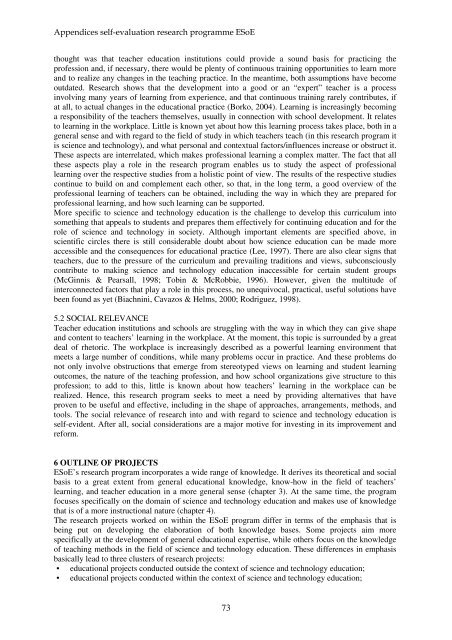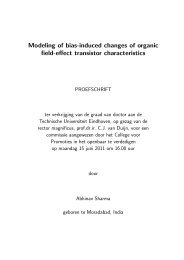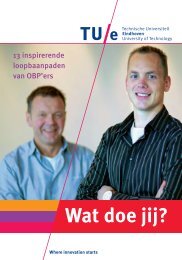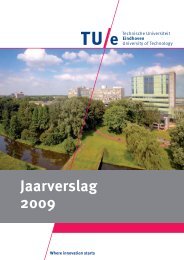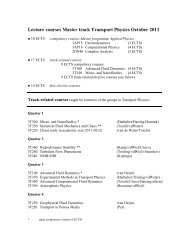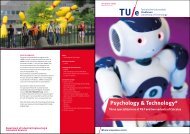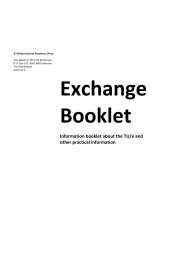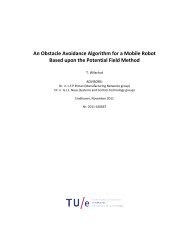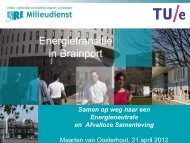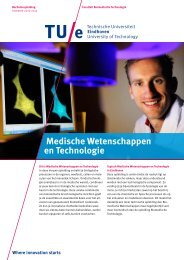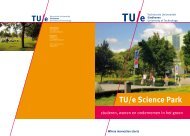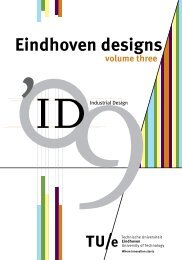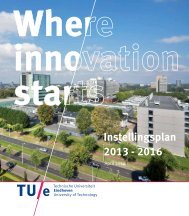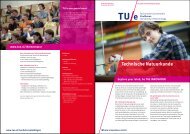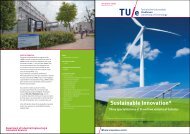Self-evaluation - Technische Universiteit Eindhoven
Self-evaluation - Technische Universiteit Eindhoven
Self-evaluation - Technische Universiteit Eindhoven
Create successful ePaper yourself
Turn your PDF publications into a flip-book with our unique Google optimized e-Paper software.
Appendices self-<strong>evaluation</strong> research programme ESoE<br />
thought was that teacher education institutions could provide a sound basis for practicing the<br />
profession and, if necessary, there would be plenty of continuous training opportunities to learn more<br />
and to realize any changes in the teaching practice. In the meantime, both assumptions have become<br />
outdated. Research shows that the development into a good or an “expert” teacher is a process<br />
involving many years of learning from experience, and that continuous training rarely contributes, if<br />
at all, to actual changes in the educational practice (Borko, 2004). Learning is increasingly becoming<br />
a responsibility of the teachers themselves, usually in connection with school development. It relates<br />
to learning in the workplace. Little is known yet about how this learning process takes place, both in a<br />
general sense and with regard to the field of study in which teachers teach (in this research program it<br />
is science and technology), and what personal and contextual factors/influences increase or obstruct it.<br />
These aspects are interrelated, which makes professional learning a complex matter. The fact that all<br />
these aspects play a role in the research program enables us to study the aspect of professional<br />
learning over the respective studies from a holistic point of view. The results of the respective studies<br />
continue to build on and complement each other, so that, in the long term, a good overview of the<br />
professional learning of teachers can be obtained, including the way in which they are prepared for<br />
professional learning, and how such learning can be supported.<br />
More specific to science and technology education is the challenge to develop this curriculum into<br />
something that appeals to students and prepares them effectively for continuing education and for the<br />
role of science and technology in society. Although important elements are specified above, in<br />
scientific circles there is still considerable doubt about how science education can be made more<br />
accessible and the consequences for educational practice (Lee, 1997). There are also clear signs that<br />
teachers, due to the pressure of the curriculum and prevailing traditions and views, subconsciously<br />
contribute to making science and technology education inaccessible for certain student groups<br />
(McGinnis & Pearsall, 1998; Tobin & McRobbie, 1996). However, given the multitude of<br />
interconnected factors that play a role in this process, no unequivocal, practical, useful solutions have<br />
been found as yet (Biachnini, Cavazos & Helms, 2000; Rodriguez, 1998).<br />
5.2 SOCIAL RELEVANCE<br />
Teacher education institutions and schools are struggling with the way in which they can give shape<br />
and content to teachers’ learning in the workplace. At the moment, this topic is surrounded by a great<br />
deal of rhetoric. The workplace is increasingly described as a powerful learning environment that<br />
meets a large number of conditions, while many problems occur in practice. And these problems do<br />
not only involve obstructions that emerge from stereotyped views on learning and student learning<br />
outcomes, the nature of the teaching profession, and how school organizations give structure to this<br />
profession; to add to this, little is known about how teachers’ learning in the workplace can be<br />
realized. Hence, this research program seeks to meet a need by providing alternatives that have<br />
proven to be useful and effective, including in the shape of approaches, arrangements, methods, and<br />
tools. The social relevance of research into and with regard to science and technology education is<br />
self-evident. After all, social considerations are a major motive for investing in its improvement and<br />
reform.<br />
6 OUTLINE OF PROJECTS<br />
ESoE’s research program incorporates a wide range of knowledge. It derives its theoretical and social<br />
basis to a great extent from general educational knowledge, know-how in the field of teachers’<br />
learning, and teacher education in a more general sense (chapter 3). At the same time, the program<br />
focuses specifically on the domain of science and technology education and makes use of knowledge<br />
that is of a more instructional nature (chapter 4).<br />
The research projects worked on within the ESoE program differ in terms of the emphasis that is<br />
being put on developing the elaboration of both knowledge bases. Some projects aim more<br />
specifically at the development of general educational expertise, while others focus on the knowledge<br />
of teaching methods in the field of science and technology education. These differences in emphasis<br />
basically lead to three clusters of research projects:<br />
• educational projects conducted outside the context of science and technology education;<br />
• educational projects conducted within the context of science and technology education;<br />
73


